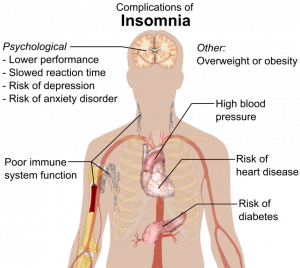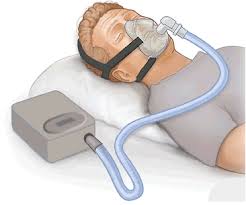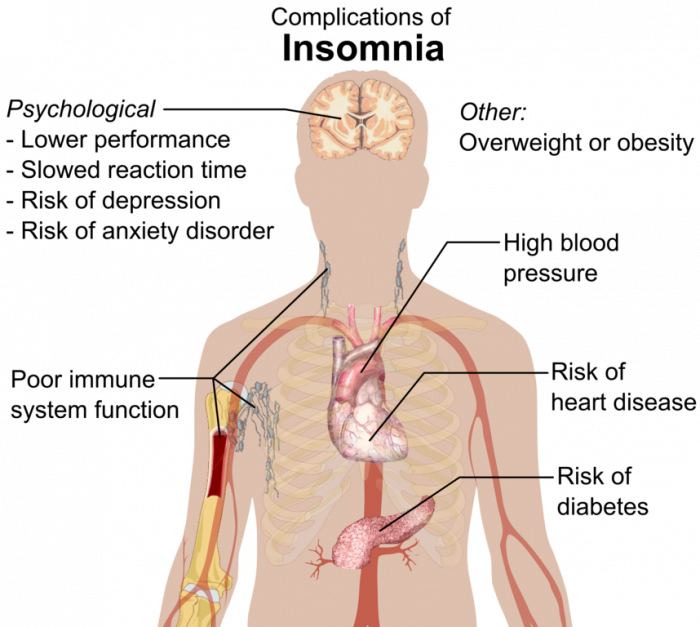 Everyone spends a night struggling to fall asleep at some point in their life. But for many, this insomnia can become a burdensome and debilitating condition that just won’t go away. Long-term insomnia can become crippling.
Everyone spends a night struggling to fall asleep at some point in their life. But for many, this insomnia can become a burdensome and debilitating condition that just won’t go away. Long-term insomnia can become crippling.
The most common cause of insomnia is stress. Insomnia is most common among people who have just lost their jobs, moved to a new town, or are under a lot of pressure in some other way.
This can cause your mind to shift into overdrive – even if you’re only subconsciously aware of it. To help cure your insomnia, try to reduce your stress by exercising daily, enjoying a little comfort food before bed, or taking some time in the evening to meditate.
The idiot box can also affect your sleep cycle. Many people are able to fall asleep in front of the TV. Before you go to bed, shut off all the electronics and read for at least half an hour. Sometimes your bedroom can become a psychological problem too. If you’re spending a lot of time during the day working or relaxing in your bedroom, try going to another room in the house.
The effects of alcohol are disputed with regards to insomnia. Many medical experts argue that a drink or two in the evening will help relax you and make it easier to sleep. But others point to the fact that alcohol dehydrates the body and can sometimes force you awake before your sleep cycle is over thanks to this dehydration. Alcohol also produces adrenaline in the body which can energize you and prevent sleep. However withdrawal from alcohol can also cause severe insomnia as the body tries to adjust.
Finally, if you experience extreme insomnia that lasts for more than a week, you could be the victim of a worse psychological problem like depression or schizophrenia. And even if you’re not, the long-term effects of insomnia could become dangerous to your health. Make sure you consult a doctor.
The Squirrel says: Don’t discount the possibility it could be sleep apnea. Basically, that’s when you snore and on the intake your breathing is cut off at the back of your throat and you stop and start yourself from sleeping. Most people don’t even know they have it as they don’t wake up enough to remember it. But it really takes its toll on you.
intake your breathing is cut off at the back of your throat and you stop and start yourself from sleeping. Most people don’t even know they have it as they don’t wake up enough to remember it. But it really takes its toll on you.
Signs and symptoms of obstructive sleep apnea include:
- Excessive daytime sleepiness
- Loud snoring
- Observed episodes of breathing cessation during sleep
- Abrupt awakenings accompanied by shortness of breath
- Awakening with a dry mouth or sore throat
- Awakening with chest pain
- Morning headache
- Difficulty concentrating during the day
- Experiencing mood changes, such as depression or irritability
- Difficulty staying asleep (insomnia)
- Having high blood pressure
 A sleep test will confirm whether you have this and then — if you are diagnosed with severe enough apnea — you have to face life with a CPAP (Continuous Positive Airway Pressure) machine. Hold out for one that is a good fit for you. You might be able to have what we call in our house, the “nose hose”, which is fastened around your head and sits under the nostrils, puffing air into your airway to keep it open. Some people have a face mask. Even though it looks a bit weird, for many, it’s a life-saver. Check out more details at the Mayo Clinic, here.
A sleep test will confirm whether you have this and then — if you are diagnosed with severe enough apnea — you have to face life with a CPAP (Continuous Positive Airway Pressure) machine. Hold out for one that is a good fit for you. You might be able to have what we call in our house, the “nose hose”, which is fastened around your head and sits under the nostrils, puffing air into your airway to keep it open. Some people have a face mask. Even though it looks a bit weird, for many, it’s a life-saver. Check out more details at the Mayo Clinic, here.
Healthy sleep basics to remember:
Healthy sleep is vital for your physical health
It promotes peak performance and productivity. It also helps you fight off infection, maintain a healthy weight and avoid chronic diseases. Without healthy sleep you are more likely to have heart disease and Type 2 diabetes.
Healthy sleep is essential for your mental health
Healthy sleep helps you to balance your mood and emotions. Without healthy sleep you are more likely to struggle with feelings of anxiety and depression.
Healthy sleep improves your memory and focus
It sharpens your mind so that you can think clearly. Sleep helps you excel at school and work. Without healthy sleep you are more likely to be forgetful and make mistakes.
Healthy sleep promotes personal and public safety
It keeps you alert and helps you to react quickly. Without healthy sleep you are more likely to have an accident while driving or at work.
Healthy sleep involves making the right choices to prioritize and protect sleep. Here are three keys to achieving and maintaining healthy sleep:
- Quantity
Most adults need at least 7 hours of nightly sleep for optimal health and productivity. Some people need more sleep to feel well-rested. Try to get 7 or more hours of sleep per night. Set a regular bedtime that is early enough for you to get a full night of sleep. - Quality
Getting good sleep is important, too. Sleeping 7 hours each night isn’t enough: You also need quality sleep. Avoid common sleep disrupters in the evening. These include alcohol, caffeine and tobacco. Talk to your doctor if you are taking a medication that disturbs your sleep. - Regularity
It also is important to sleep at the right time. Healthy sleep is part of the daily rhythm of life. Your body sleeps best at night when it is dark. It also functions best when you keep a regular routine. Try to wake up at the same time every morning, and go to bed when you feel sleepy.
The quantity, quality and regularity of your sleep can be disrupted if you have a sleep disorder. Talk to your doctor if you have an ongoing problem that prevents you from sleeping well. For more help contact an AASM accredited sleep center near you.
Make healthy sleep one of your top priorities. You must sleep well to be well!
